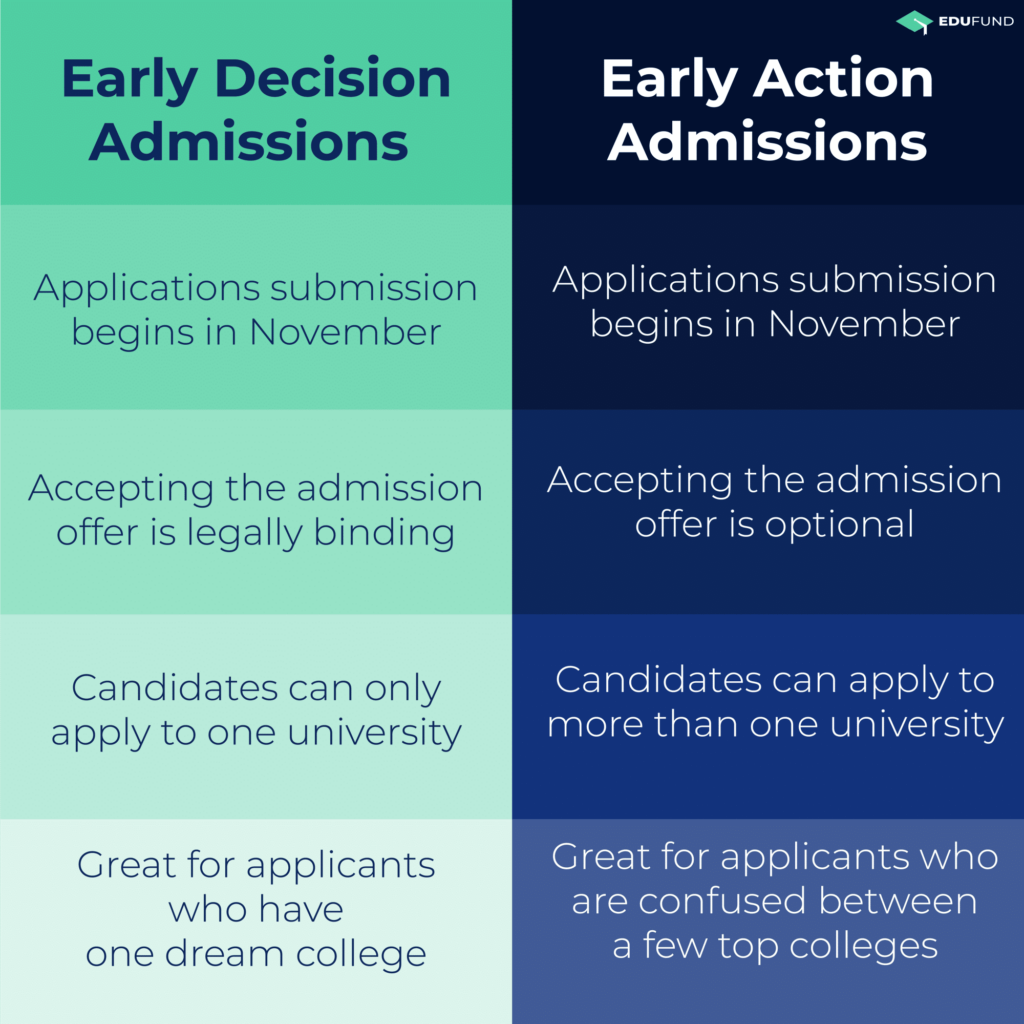College admissions can be exciting and overwhelming for students and their families. As you navigate the many options, you’ll likely come across the terms “Early Action” and “Early Decision.”
These two popular admissions strategies can give you a competitive edge and potentially increase your chances of securing a spot at your dream college.
In this blog, we’ll delve into the key differences, benefits, and considerations of Early Action (EA) and Early Decision (ED) to help you make an informed decision.
Early decision vs Early action

Early Action (EA)
Early Action is a non-binding admissions process that allows students to submit their applications early—usually by November or December while still having until the regular decision deadline to make a final college choice. Here’s what you need to know about EA:
- Flexibility:
One of the primary advantages of Early Action is the flexibility it provides. As an EA applicant, you’re not obligated to attend the college if accepted.
You can still apply to other institutions, compare financial aid offers, and weigh all your options before making a final decision.
- Timelines:
With Early Action, you typically receive your admissions decision earlier than regular decision applicants—often in December or January. This early notification can alleviate the stress of waiting and give you more time to prepare for the next steps, such as exploring scholarship opportunities or visiting campuses.
- Demonstrated interest:
Applying Early Action can demonstrate your enthusiasm and commitment to a particular college. It shows that you’ve taken the initiative to complete your application well before the regular deadline and signals your genuine interest in attending the institution.
- Strategic Advantage:
For competitive colleges that offer EA, early applicants may have a slightly higher acceptance rate than the regular pool.
By applying to EA, you’re presenting yourself as a strong candidate while the admission committee is still reviewing a smaller number of applications, thus potentially increasing your chances of admission.
Popular Universities that offer early action
Here is a list of universities that offer Early Action admission rounds to their potential students:
- University of Chicago
- University of Illinois at Chicago
- University of Notre Dame
- Massachusetts Institute of Technology (MIT)
- Columbia University
- Yale University
- Stanford University
Early Decision (ED)
Early Decision is a binding admissions option that requires students to commit to attending a specific college if accepted. Here’s what you should consider before applying for ED:
- Commitment:
Applying for Early Decision allows you to enroll at the college if admitted legally. If you receive an acceptance letter, you must withdraw all other college applications and decline any other offers you may have received. Only choose ED if you are sure about your college choice.
- Higher Acceptance Rates:
Colleges tend to admit a higher percentage of their incoming class through Early Decision. ED applicants are considered a committed group with a strong desire to attend the institution. This can be a strategic advantage for students with a clear top-choice college.
- Financial Considerations:
Before applying for Early Decision, carefully evaluate the college’s financial aid policies. While some institutions are known for providing generous aid packages, others may not offer the same financial support.
Ensure you thoroughly understand the financial implications and have discussed them with your family before committing to ED.
- Deadlines and Timelines:
ED applications have early deadlines, usually around November. If you decide to apply to ED, you must be well-prepared to meet these earlier dates.
The admissions decision is typically rendered in December, allowing you to plan ahead and potentially enjoy a stress-free senior year.

Importance of Family Budgeting
Which option is right for you?
Choosing between Early Action and Early Decision is a personal decision that depends on your circumstances, preferences, and college goals. Here are some factors to consider:
- Level of Certainty:
If you have a clear top-choice college and are confident that it’s the best fit for you academically, socially, and personally, Early Decision might be the right choice.
However, if you want to keep your options open and explore multiple colleges, Early Action allows you to apply early without the binding commitment.
- Financial Considerations:
Consider your financial situation and research each college’s financial aid policies. If affordability is a significant factor in your college decision, ensure you clearly understand the aid packages offered by your preferred colleges before making any binding commitments.
- Application Preparedness:
Both EA and ED applications require careful preparation, but ED applications have earlier deadlines. If you feel confident in your application materials and are ready to submit them early, ED may be a viable option.
However, if you need more time to fine-tune your application, Early Action provides a less restrictive timeline.
Popular Universities that offer Early Decision
Here are some popular universities that offer early decisions to their potential students:
- Brown University
- Cornell University
- Dartmouth University
- New York University
- Duke University
- Northwestern University
- University of Pennsylvania
Conclusion
Early Action and Early Decision are popular admissions strategies that offer distinct advantages for college applicants.
Early Action allows for flexibility, earlier decisions, and demonstrated interest, while Early Decision can provide a strategic advantage and potentially higher acceptance rates.
Ultimately, the choice between EA and ED depends on your level of certainty, financial considerations, and readiness to commit to a specific college.
Remember to thoroughly research and weigh the pros and cons of each option before making a well-informed decision that aligns with your college goals and aspirations. Good luck with your college applications!


